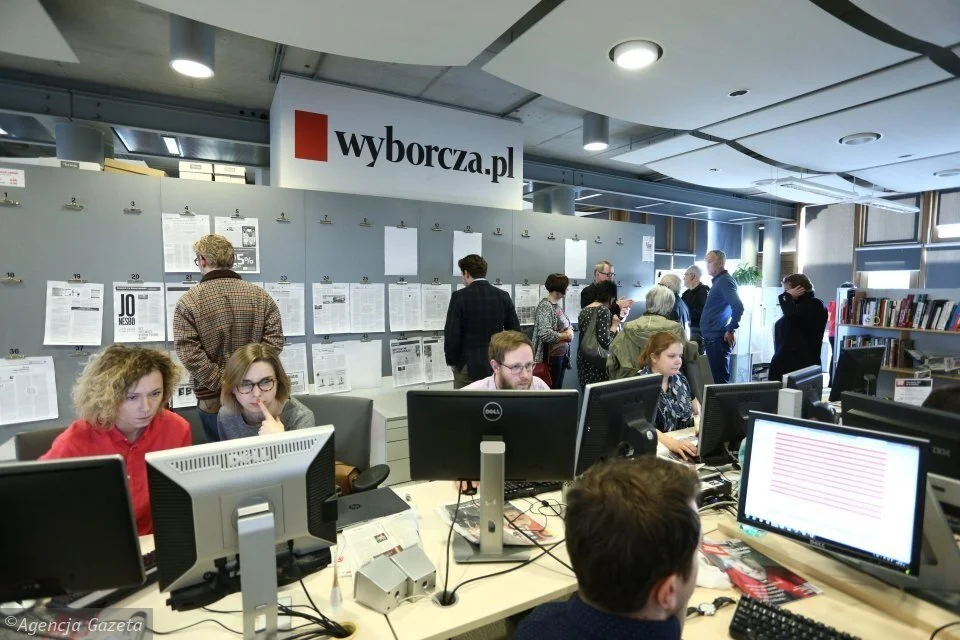How SLAPP tactics are affecting media in Poland – and who is doing the SLAPPing
Gazeta Wyborcza newsroom. Photo: Adam Stępień / Agencja Wyborcza.pl
Undaunted by European Union rebukes for trying to control the judiciary and stifle media freedom, Poland's government has been at the forefront of using abusive and unfounded suits to try to muzzle public speech.
Poland’s SLAPP (Strategic Lawsuit Against Public Participation) problem includes some 90 cases directed at the independent newspaper and news site Gazeta Wyborcza, something the International Press Institute (IPI) has assessed is designed “to silence its coverage and the chilling effect this has on independent Polish media.”
The spreading phenomenon of SLAPPS, primarily used by the rich and powerful, whether companies or individuals, with deep pockets, are typically intended to put such financial pressure on journalists, the media and civil society that they have to back off. In Poland, however, the situation is made more complicated by the number of suits launched by government entities or groups with close links to the state.
In 2021, Gazeta Wyborcza Editor-in-Chief Adam Michnik was sued by Justice Minister and Prosecutor General Zbigniew Ziobro as a result of a over a story that questioned the calculation of the Ziobro’s salary. Daniel Obajtek, the CEO of Poland’s state-run oil giant Orlen has also filing a number of lawsuits in an attempt to stop reporting on real estate deals he has been involved in.
Commenting on the targeting of Gazeta Wyborcza, the European Federation of Journalists (EFJ) said that “The scale of this coordinated legal harassment of a critical newspaper is unique within the EU… [showing] the use of lawsuits as a tool for pressuring and financially draining the newspaper.”
To tackle a problem that is particularly acute in the Polish environment, a new pan-European consortium, Pioneering Anti-SLAPP Training for Freedom of Expression (PATFox) is putting together Europe’s first curriculum and training to legal professionals in 11 EU member states, including Poland. Blueprint for Free Speech is a partner in the project.
Since 2020, the Polish investigative journalism organisation - and PATFox partner - OKO.press has been collating information on SLAPPs - it facing seven suits itself, in part as a result of its reporting on the ties between judges and politicians. One journalist, who asked not to be identified, told Oko.press that it had cost more than 20,000 euros to defend ongoing cases against him, with the bill mounting.
Other prominent Polish SLAPP cases collated by Article 19 include one brought by Poland’s so-called “Poultry King,” for a coverage of the environmental impact of the meat and livestock industry; and another by the son of a high-profile public figure over a report exposing financing of private businesses with public funds.
The Journalism Society (Towarzystwo Dziennikarskie), a Polish NGO, said it found that from 2015-2021 there were 187 SLAPP suits against independent media and journalists brought by individuals and entities with ties to the state.
Ewa Ivanova, a board member of the society and journalist from Gazeta Wyborcza, said in 2021 when the report was released that the cases show “retaliation or pressure applied on the media or journalists,” and that a “shocking picture of various methods of harassing media” emerged.
Among the cases cited by the Journalism Society, 41 were brought by public institutions including prosecutors, police and the ministries, 26 by state companies facing government influence, nine by the state broadcaster TVP which is a propaganda tool, and 15 by government-appointed judges.
Poland’s legal system facilitates SLAPP claimants in several respects. Article 212 of the Polish criminal code creates the possibility of imprisonment or a fine for defamation of individuals, groups or institutions. Exacerbating the problem is that court hearings are typically held in secret.
As noted in research conducted by The Coalition Against SLAPPs in Europe (CASE), Poland’s lower courts are still independent of the government and suits at that level against journalists and other public watchdogs are usually dismissed. The unfounded nature of cases is, of course, a key characteristic of SLAPPs – and the financial and other burdens of defending such cases exerts a chilling effect on those they target.
The extent of that chilling effect is hard to assess, but being a prominent figure is not in itself a protection. A well-known Polish investigative reporter Grzegorz Rzeczkowski was let go by Polityka, a major independent weekly magazine, which was bearing the costs of the four SLAPPs targeted against him. Rzeczkowski is a veteran reporter who investigated the wiretapping scandal that led to major political changes in Polish politics in 2014.
The International Press Institute (IPI) expressed their concerns that the dismissal “could send a signal that journalists in Poland who are targeted with SLAPPs for their investigations into sensitive issues will be left to face such lawsuits without the support of their employers and have a chilling effect on press freedom in the country.”
In 2015 Poland was ranked 18th best out 180 countries in the world for media freedom by Reporters Without Borders, but the next year - when the Law and Justice (PiS) came to power – saw its ranking fall to 47th. The country is occupies 66th place on the 2022 Press Freedom Index; the lowest in the EU save for Bulgaria and Greece, which occupy 91st and 108th places respectively.

